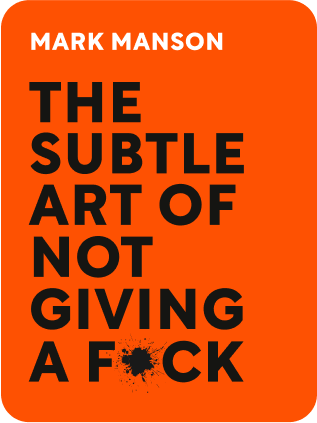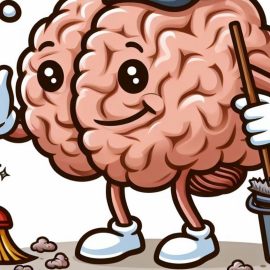

This article is an excerpt from the Shortform book guide to "The Subtle Art of Not Giving a F*ck" by Mark Manson. Shortform has the world's best summaries and analyses of books you should be reading.
Like this article? Sign up for a free trial here .
What are some good values to have? Which values can be destructive? What are some counterintuitive good values?
Defining your values is important because without values, you have no identity. Values can be both constructive and destructive and can be a determining factor in whether you’re happy or not.
Keep reading to learn what some good values to have are.
Good Values vs. Bad Values
Your values are what you believe to be important and want to achieve. Our values and standards can be constructive or destructive — they may lead to good problems that we enjoy solving or to problems that stymie and frustrate us, leading to unhappiness.
Good values to have are based on fact, are constructive, and have an outcome you can control.
For example, being honest is a good value because you have control over how you implement it, it’s factually determined, and it’s constructive (telling someone the truth may be unpleasant but could benefit one or both of you).
Other good values include behaving ethically, doing constructive work, standing up for yourself, supporting and caring for others, and self-respect. They are factually based, constructive, and you can control them. You also develop them internally.
Bad values are non-factual, non-constructive, and out of your control.
For example, being popular is a bad value because it’s based on what others think of you, which you don’t control. It’s also not factually or reality based: feeling popular doesn’t mean you actually are popular.
Unhealthy values include dishonesty/lying to others, manipulation and force, overindulgence in something, always feeling good, always being liked, attention-seeking. They are not fact-based or constructive. They can be externally driven.
Destructive Values
To take this idea further, here are some common destructive values that lead to difficult or even unsolvable problems:
- Pleasure: It’s an important part of life but not sufficient for happiness in and of itself. If you make feeling good all the time your priority, you’ll run into problems. For instance, drug addiction, adultery, and obesity can result if you prioritize pleasure. Besides creating difficult problems, you end up feeling more miserable, anxious and depressed.
- This superficial form of pleasure is constantly marketed and sold to us. But it doesn’t last. You may use it to distract yourself from pain in our lives, but pain doesn’t go away unless you address the underlying causes.
- A deeper, lasting form of pleasure results when you base your life on constructive values and standards and handle challenges successfully.
- Material success: People often base their self-esteem on what they own or how much money they make. But research has shown that continuing to acquire wealth provides less and less satisfaction, once your basic needs are met.
- When you rank wealth/success and its status symbols above deeper values as honesty, ethics, and caring (which impact others), you become arrogant in addition to being shallow.
- Always being right: Research shows that we’re wrong about things frequently if not constantly. If you don’t admit mistakes you can’t learn from them. It’s better to assume ignorance and set the stage for growth.
- Staying positive: Staying positive has benefits, but it’s counterproductive and unhealthy to deny reality when it’s bad, or to repress negative emotions, because this leads to more problems.
- Sometimes things go wrong, people disappoint and upset you, you experience rejection, etc. Denying this perpetuates problems. Constantly being positive is a way of avoiding dealing with problems rather than solving them.
- Denying problems through forced positivity deprives you of the chance to derive satisfaction from solving them. Dealing with challenges such as raising a child or starting a business is stressful but gives life a sense of meaning and accomplishment. We even look back at these struggles with nostalgia.
- When you have negative experiences and emotions you need to express them in a healthy and constructive way that reflects your values. (For example, if nonviolence is a value, you can’t hit someone when you’re angry.)
Poor values don’t lead to meaning and accomplishment. If you adopt the right values and standards, satisfaction and accomplishment will result.
Prioritizing Your Values
When you have poor values and standards, you’re giving f*cks about things that don’t matter and lead to difficult or unsolvable problems.
By contrast, when you adopt good values and standards, you reserve your f*cks for things that lead to good problems and enhance your well-being.
For example, after leaving the Beatles Pete Best eventually reprioritized what he cared about, and defined success differently, which led to a satisfying life. Adopting and prioritizing good values — choosing constructive things to give a f*ck about — is what self-improvement is all about.
Five Counterintuitive Good Values
The rest of the book discusses five beneficial, but counterintuitive values (they run counter to cultural and social media messages). They require addressing problems rather than avoiding them through denial or feel-good exercises.
- Taking responsibility for everything that happens in your life, whether or not it’s your fault
- Accepting uncertainty: Accepting that you might be wrong, and that you don’t know everything. Examining and doubting your beliefs.
- Embracing failure: Being willing to uncover your flaws and fix them, as well as learn from what goes wrong.
- Practicing rejection: Focusing on a few important things, and rejecting unimportant things. Also developing the ability to say “no,” and accept “no” from others.
- Reflecting on your mortality to keep your life and values in perspective.

———End of Preview———
Like what you just read? Read the rest of the world's best book summary and analysis of Mark Manson's "The Subtle Art of Not Giving a F*ck" at Shortform .
Here's what you'll find in our full The Subtle Art of Not Giving a F*ck summary :
- How to clarify what's important to you (and not just what you think should be important)
- Why it's okay for things to not always go well in life
- Why you need to care about fewer things






